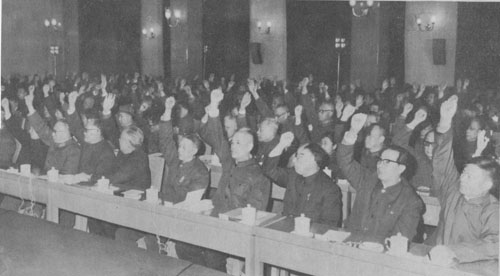|
 |
|
The session unanimously adopts the communique |
The 11th Central Committee of the Communist Party of China held its third plenary session in Beijing between December 18 and 22, 1978. It was attended by 169 members and 112 alternate members of the Central Committee. Hua Guofeng, Chairman of the CPC Central Committee, and Ye Zhenying, Deng Xiaoping, Li Xiannian, Chen Yun and Wang Dongxing, Vice Chairmen, were present. Comrade Hua Guofeng presided over the session and made important speeches.
A central working conference held prior to the session made full preparations for it.
The plenary session unanimously endorsed the policy decision put forward by Comrade Hua Guofeng on behalf of the Political Bureau of the Central Committee on shifting the emphasis of our Party's work and the attention of the people of the whole country to socialist modernization.
The session thoroughly discussed questions in agriculture and held that the whole Party should concentrate its main energy and efforts on advancing agriculture as fast as possible. It agreed to distribute to the provinces, municipalities and autonomous regions for discussion and trial use the Decisions of the Central Committee of the Communist Party of China on Some Questions Concerning the Acceleration of Agricultural Development (Draft) and the Regulations on the Work in the Rural People's Communes (Draft for Trial Use). It discussed arrangements for the national economic plans for 1979 and 1980 and approved them in principle.
The session seriously discussed some major political events which occurred during the cultural revolution (1966-76) and certain historical questions left over from an earlier period. It decided to cancel the erroneous documents issued by the Central Committee in regard to the movement "to oppose the Right-deviationist wind to reverse correct verdicts" and the Tian'anmen events and also examined and corrected the erroneous conclusions which had been adopted on Peng Dehuai, Tao Zhu, Bo Yibo, Yang Shangkun and other comrades.
The plenary session elected Comrade Chen Yun an additional Vice Chairman of the Central Committee, elected Comrades Deng Yingchao, Hu Yaobang and Wang Zhen additional Members of the Political Bureau of the Central Committee, and elected a 100-member Central Commission for Inspecting Discipline headed by Comrade Chen Yun.
The session highly evaluated the discussion of whether practice is the sole criterion for testing truth, noting that this is of far-reaching historic significance in encouraging comrades of the whole Party and the people of the whole country to emancipate their minds and follow the correct ideological line.
The session emphatically pointed out: Comrade Mao Zedong was a great Marxist. The lofty task of the Party Central Committee on the theoretical front is to lead and educate the whole Party and the people of the whole country to recognize Comrade Mao Zedong's great feats in a historical and scientific perspective, comprehensively and correctly grasp the scientific system of Mao Zedong Thought and integrate the universal principles of Marxism-Leninism-Mao Zedong Thought with the concrete practice of socialist modernization and develop it under the new historical conditions.
Basing itself on the experience and lessons drawn from the history of our Party, the plenary session decided to improve the practice of democratic centralism within the Party, to amplify the Party rules and regulations and to enforce strict discipline in the Party. The Party members' right to make criticisms within the Party concerning the leadership at higher levels, up to Members of the Standing Committee of the Political Bureau of the Central Committee, must be guaranteed and any practice that does not conform to the Party's democratic centralism and the principle of collective leadership should be resolutely corrected.
For more information:
Email us at: en@bjreview.com | 